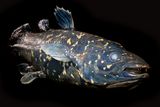Now Reading: Extinct Coelacanth Fossils Misidentified for Over a Century
-
01
Extinct Coelacanth Fossils Misidentified for Over a Century
Extinct Coelacanth Fossils Misidentified for Over a Century

Swift Summary
- Archaeologists identified specimens in U.K. museums, previously mischaracterized as marine reptiles since the late 1800s, to be extinct coelacanth fish from the triassic period (~200 million years ago).
- The study revisited fossils using X-ray scans and added over fifty specimens to the British Rhaetian coelacanth record, correcting prior misidentifications.
- Coelacanths are rare today, with two extant species: one discovered in South Africa (1938) and another near indonesia (1998). While their evolution is slow due to stable habitats, they have adapted over millions of years.
- Ancient coelacanths likely lived near shorelines in brackish or freshwater environments; some may have been euryhaline – capable of tolerating varied salinity levels for diverse aquatic habitats.
- Researchers propose that ancient coelacanths were seafloor dwellers with diets possibly including small Pachystropheus reptiles whose bones led to initial identification errors.
Indian opinion Analysis
The discovery clarifies decades-old fossil misclassification and advances scientific understanding of extinct species like coelacanths-valuable from an evolutionary perspective. Known as “living fossils,” modern-day coelacanth continuity underscores ecological stability’s role in long-term survival while highlighting adaptation possibilities even under static conditions.
For India’s scientific community engaged in paleontology and biodiversity studies, this case could serve as encouragement for reassessing local fossil collections using advanced technology like X-ray scanning. These methods might yield significant insights into India’s prehistoric ecosystems or contribute further findings on species persistence through geological epochs.
Such global advancements reaffirm the importance of museum collaborations and meticulous documentation practices for conserving knowledge about Earth’s biological heritage-a lesson applicable universally across nations engaging with paleontological pursuits.
Read More: Fossils Of Extinct Coelacanths Faced A Case of Mistaken Identity For More Than A Century



























